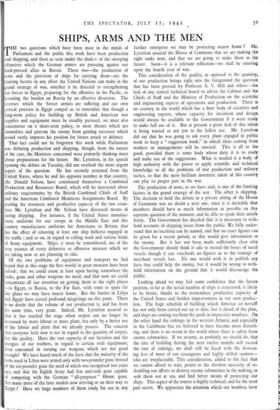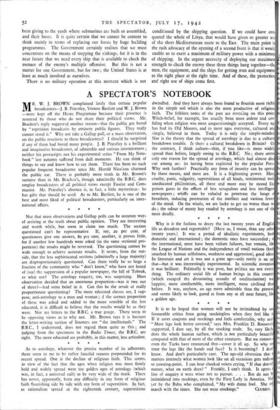SHIPS, ARMS AND THE MEN
HE two questions which have been most in the minds of Parliament and the public this week have been production and shipping, and these as seen under the shacluti of the sweeping offensives which the German armies are pursuing against our hard-pressed allies in Russia. These two—the production of arms and the provision of ships for carrying them—are the limiting factors in any effort the United Nations can make in the grand strategy of war, whether it be directed to strengthening our forces in Egypt, preparing for the offensive in the Pacific, or lessening the burden on Russia by an effective diversion. The reverses which the Soviet armies are suffering and our own critical position in Egypt compel us to remember that though a long-term policy for building up British and American war supplies and equipment must be steadily pursued, we must also concentrate on a short-term policy, to meet threats which are immediate and prevent the enemy from gaining successes which would vastly improve his position for future attack or defence. That fact could not be forgotten this week while Parliament was debating production and shipping, though, from the nature of the case, the Ministers concerned were primarily thinking more about preparations for the future. Mr. Lyttelton, in his speech opening the debate on Tuesday, did not overlook the more urgent aspect of the question. He has recently returned from the United States, where he and his opposite number in that country, Mr. Donald Nelson, have constituted themselves a Combined Production and Resources Board, which will be instructed about military requirements by the British Combined Chiefs of Staff and the American Combined Munitions Assignments Board. By pooling the resources and productive capacity of the two coun- tries Mr. Lyttelton and Mr. Nelson have discussed means of saving shipping. For instance, if the United States manufac- tures uniforms for our troops in the Middle East and this country manufactures uniforms for Americans in Britain, that has the effect of releasing at least one ship hitherto engaged in the traffic ; and so on, in regard to rolling stock and various kinds of Army equipment. Ships, it must be remembered, are of the very essence of every defensive or offensive measure which we are taking now or are planning to take.
Of the two problems of equipment and transport we had hoped that at this stage the first would in great measure have been solved ; that we could count at least upon having somewhere the tanks, guns and other weapons we need, and that now we could concentrate all our attention on getting them to the right places —to Egypt, to Russia, to the Far East, with some to spare for any plans we may have nearer home. But the battles in Libya and Egypt have caused profound misgivings on this point. There is no doubt that the volume of our production is, and has been for some time, very great. Indeed, Mr. Lyttelton assured us that it has reached the stage when output can no longer be increased by more labour or more plant, but only by a better use of the labour and plant that we already possess. The concern that everyone feels now is not in regard to the quantity of output, but the quality. Have the vast capacity of our factories and the energies of our workers, in regard to certain vital equipment, been consumed in turning out weapons which are not good enough? We have heard much of the facts that the majority of the tanks used in Libya were armed only with two-pounder guns instead of the six-pounder guns the need of which was recognised two years ago, and that the Eighth Army had few anti-tank guns capable of competing with the German " all-purposes " 88mm. guns. Are many more of the later models now arriving or on their way to Egypt ? Have we large numbers of them ready for use in any further enterprise we may be projecting nearer home ? Mr. Lyttelton assured the House of Commons that we are making the right tanks now, and that we are going to make them in the future. Soon—it is a relevant reflection—we shall be entering upon the fourth year of war.
This consideration of the quality, as opposed to the quantity, of our production brings right into the foreground the question that has been pressed by Professor A. V. Hill and others—the lack of any central technical board to advise the Cabinet and the Chiefs of Staff and the Minister of Production on the scientific and engineering aspects of operations and production. There is no country in the world which has a finer body of scientists and engineering experts, whose capacity for invention and design would always be available to the Government if it were ready to make full use of it. But at present a great deal of this talent is being wasted or not put to the fullest use. Mr. Lyttelton did say that he was going to ask every plant engaged in public work to keep a "suggestion book," in which ideas coming from workers or managements will be entered. This is all to the good, provided there is some body whose duty it is to study and make use of the suggestions. What is needed is a body of high authority with the power to apply scientific and technical knowledge to all the problems of war production and military tactics, so that the most brilliant inventive talent of this country can play its proper part in the war.
The production of arms, as we have said, is one of the limiting factors in the grand strategy of the war. The other is shipping. The decision to hold the debate in a private sitting of the House of Commons was no doubt a wise one, since it is desirable that members should have as much information as possible on this supreme question of the moment, and be able to speak their minds freely. The Government has decided that it is necessary to with- hold accounts of shipping losses from the public. We fully under- stand that no localities can be named, and that no exact figures can be given for a recent period, as this would give information to the enemy. But it has not been made sufficiently clear why the Government should think it safe to record the losses of naval vessels though it can vouchsafe no figures as to the tonnage of merchant vessels lost. No one would wish it to publish any facts that could help the enemy, but it would be wrong to with- hold information on the ground that it would discourage the public.
Looking ahead we may feel some confidence that the future position, so far as the actual number of ships is concerned, is likely to be better, thanks to the tremendous productive capacity of the United States and further improvements in our own produc- tion. The huge schedule of building which America set herself has not only been carried out up to date, but is ahead of the plan, and ships are coming out from the yards in impressive numbers. On the other hand the sinkings in the western Atlantic and especially in the Caribbean Sea are believed to have become more disturb- ing, and there is no ocean in the world where there is safety from enemy submarines. If we assume, as probably we should do, that the rate of building during the next twelve months will exceed the rate of sinkings, we shall still be faced with the distress- ing loss of more of our courageous and highly skilled seamen— who are irreplaceable. This consideration, added to the fact that we cannot afford to wait, points to the absolute necessity of re- doubling our efforts to destroy enemy submarines in the making, to seek them out at sea, and find better means of protecting our ships. -This aspect of the matter is highly technical, and for the most part secret. We appreciate the attention which our bombers have been giving to the yards where submarines are built or assembled, and their bases. It is quite certain that we cannot be content to think mainly in terms of replacing our losses by huge building programmes. The Government certainly realises that we- must concentrate on the means of stopping the sinkings, for it is in the- near future that we need every ship that is available to check the menace of the enemy's multiple offensive. But this is not a matter for one Government, but for two ; the United States is at least as much involved as ourselves.
There is no military operation at this moment which is not conditioned by the shipping question. If we could have con quered the whole of Libya, that would have given us greater u of the short Mediterranean route to the East. The main point the rash advocacy of the opening of a second front is that it would enable us to exert a maximum of military power with a minimu of shipping. In the urgent necessity of deploying our maximu strength to check the enemy these three things hang together—th men, the equipment, and the ships for getting men and equipme to the right place at the right time. And of these, the protectio and right use of ships come first.



























 Previous page
Previous page